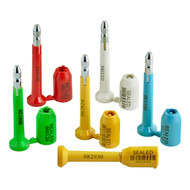Choosing the Right Seals for Trucks
Posted by Steve Diebold
Losses from cargo theft including goods shipped by truck are estimated to be in the tens of billions of dollars annually. Seals carefully chosen for their purpose and used effectively can not only help investigate and prosecute cargo thieves, but they can also help mitigate or even prevent losses.
Within the overall category of “trucks” are numerous classes and types that need different seals depending on many factors. Here we discuss some of the common types and purposes for trucks and which seals are best for those applications.
LONG HAUL TRACTOR TRAILERS
This is one of the most common uses of trucks for cargo and one of the most vulnerable. When trucks are going to be left alone for an extended period while loaded, they become targets. It is highly recommended that a barrier seal be used for this purpose. Bolt seals and cable seals are the top choice.* AC&M offers multiple options for either type. Many are certified to meet High Security standards under ISO-17712, though seals that perform just below those test standards can also be very effective.
A less expensive metal or plastic band seal is suitable for long haul trucks that are not unattended for long periods or are under control and watch in safer locations throughout their use.
Using less expensive indicative seals instead of high strength barrier seals is also a good choice for cargo that is not usually a theft target, or for empty trailers that simply need to have evidence if they were opened by someone not authorized to do so.
*Whether to choose cable or bolt seals for high strength applications is a decision the user makes based on their operational capabilities and needs. A bolt seal is more compact and can be cut off with standard bolt cutters or rotary cutter or portable saw. Cable seals are harder to cut because they require a sharp bypass cutter to remove. These are not as common and often not readily available to many truckers, so users prefer the solid bolt type seal. Meanwhile, cable seals are flexible and usually are installed on unique or odd shaped truck hasps and closures, where bolt seals do not easily fit.
SHORT HAUL TRAILERS AND BOX TRUCKS
This is also one of the largest truck types in terms of vehicle numbers in use. It includes trucks that are only exposed to potential theft for a short time, and under control of reliable drivers. They are sometimes in transit from terminal to terminal but more often they are for local or regional delivery of goods.
These can be well protected by a simple band seal. Band seals have been around for over a century and historically are the most used type of seal on trucks. They are easy to ship, store, insert on door hasps, and to remove. They also provide large highly readable letters and serial numbers.
While band seals are very popular, plastic pull-up seals and even padlock type seals can often be a better choice for this purpose. Technology has brought many new adjustable pull-up band seals and more sophisticated padlock seals with allowance for more information including barcodes and logotypes.
For more exposed high-value goods in transit for short distance there is vulnerability to fast “smash and grab” thieves. A cable seal is a good choice as it will slow or deter that type of theft. There are cable seals that require cutting with stronger tools but not as strong as those needed to meet “High Security” strength standards. Therefore, are not as expensive. Cables of 1.5mm diameter and larger like AC&M Cablelock 1.5 seals are used often on delivery trucks of valuable or sensitive cargo in short hauls. A good example is chain store delivery trucks moved regionally with consumer goods like electronics.
TANKERS AND HOPPER TRAILERS
This group of trucks involves multiple levels of value, risk, and several unique closures requiring a longer more flexible seal. Both theft and safety are part of the decision criteria for choosing seals here.
On tankers of chemicals, fuel, hazmat and other high value or sensitive products stronger seals are usually called for. Fuel tankers, chemical haulers and others who carry hazardous materials are upgrading from indicative seals to stronger cable seals. The diameter and strength of the cable seal goes up with increases in value and risk.
Hopper closures and many of the hasps and valves on tankers cannot be easily locked with typical shorter seals in the 7-8-inch range. AC&M offers several types of cable seals and longer heavy-duty plastic band seals to fit them. Our experts can advise users if they are not sure which type is best for them.
Some applications like milk and bulk liquids in tankers use so many seals that cable seals are not practical and usually not necessary. A simple pull-up plastic seal works very well to indicate tampering. Theft is far less frequent with trucks carrying these products and strength is not a major factor.
If you have questions about seals for trucks or any seal application, reach out to one of AC&M’s experts who have decades of experience and are ready to help.

